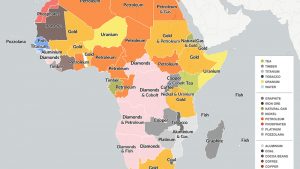 February 21,2018//-Sub-Saharan Africa’s (SSA) economic recovery is expected to have remained on firm footing in the final half of 2017, as the region recovers from stunted activity in 2016, according to the March 2018 estimate compiled by FocusEconomics FocusEconomics, a leading provider of economic analysis and forecasts for 127 countries in Africa, Asia, Europe and the Americas.
February 21,2018//-Sub-Saharan Africa’s (SSA) economic recovery is expected to have remained on firm footing in the final half of 2017, as the region recovers from stunted activity in 2016, according to the March 2018 estimate compiled by FocusEconomics FocusEconomics, a leading provider of economic analysis and forecasts for 127 countries in Africa, Asia, Europe and the Americas.
The report’s comprehensive GDP data revealed that regional GDP grew 2.8% annually in third quarter (Q3), matching Q2’s result and up a notch from last month’s estimate.
Buoyant growth in Tanzania drove the upward revision, as rising diamond and coal production fuelled robust 6.8% year-on-year growth, it added.
“Meanwhile, contrasting momentum in the region’s largest two economies, Nigeria and South Africa, held the region’s overall momentum stable from Q2”.
The economists at FocusEconomics noted that Nigeria’s economy accelerated in the third quarter thanks to faster growth in the oil sector, while weak confidence and high unemployment weighed on South Africa’s momentum.
Leading economic indicators for the fourth quarter point to another period of steady growth, and FocusEconomics estimates that GDP again increased 2.8% annually.
In Kenya, decreased political tensions, improving sentiment and recovering agricultural production are expected to have fueled a modest uptick in growth in the fourth quarter, while growth in Ghana likely decelerated somewhat from Q3’s three-year high.
Meanwhile, Nigeria’s recovery likely gained steam thanks to higher oil prices and improved liquidity. Activity in major player South Africa is expected to have remained lackluster amid weak confidence due to corruption scandals.
As the SSA economic recovery continues at a steady pace, the region has seen some political turnover in recent weeks. South Africa’s President Jacob Zuma resigned on 14 February, paving the way for Cyril Ramaphosa to take the reins.
Cyril Ramaphosa, who was sworn in on 15 February, 2018 inherits a stagnating economy burdened with high unemployment and prevalent corruption. The change in administration has caused the rand to rally, as Ramaphosa has pledged to pursue more market-friendly policies and combat corruption.
All eyes will be on the government’s budget, which will be unveiled on 21 February, to see if promises of reforms and more sustainable fiscal spending are held up.
Ethiopia has also seen a political transition in recent days, with Prime Minister Hailemariam Desalegn resigning on 15 February 2018 following mass unrest, anti-government protests and calls for rapid reforms along with a free and fair election.
Following Hailemariam’s resignation, the government declared a state of emergency, effectively banning protests. The state of emergency still needs to be ratified by parliament.
High levels of discontent could disrupt economic activity if protests and episodes of violence persist, while the turbulence is also threatening the government’s legitimacy.
African Eye Report


